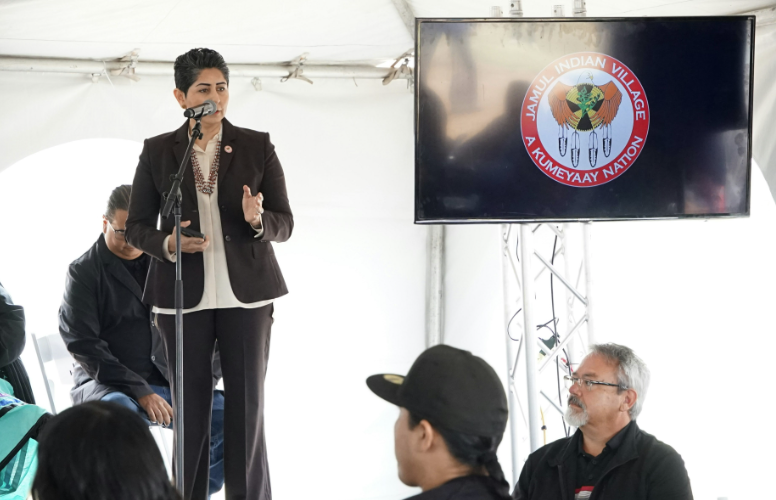
- Details
- By Native News Online Staff
The Jamul Indian Village of California marked a momentous occasion last week, celebrating the passage of S. 3857—the Jamul Indian Village Land Transfer Act—alongside members of Congress, local officials, Tribal Leaders, Elders, and community members. The legislation facilitates the long-awaited return of 172.10 acres of ancestral land in Jamul to the Tribe.
This historic transfer, formalized through federal legislation, places four parcels of land into trust on behalf of the Jamul Indian Village. The bill was introduced in the House by Congressman Darrell Issa and co-sponsored by Congressman Juan Vargas, with companion legislation in the Senate introduced by Senator Alex Padilla and former Senator Laphonza Butler. President Joe Biden signed the Act into law on December 23, 2024.
With the addition of these lands, the Tribe’s reservation expands from a mere 6 acres to more than 178 acres—an essential step toward the Tribe’s vision for sustainable growth, economic self-sufficiency, and community revitalization.
To commemorate the occasion, the Tribe hosted a Fee-to-Trust Celebration on one of the newly transferred parcels, known historically as the Barrett property. The event featured remarks from Tribal Council Chairwoman Erica M. Pinto, Congressman Issa, State Senator Brian Jones, and San Diego Mayor Todd Gloria.
"The Tribe has worked long and hard to create the resources necessary to buy land in our ancestral homeland,” Tribal Council Chairwoman Erica M. Pinto said. “With the passage of the bill and the land brought back into trust we can now focus on new opportunities to build our community back" she continued.
The celebration included a traditional land blessing, storytelling by Tribal members about their historical ties to the land, and a closing bird song to honor the occasion. Plans for the Barrett property include restoring the Barrett House, developing commercial and community-use areas along the frontage, and constructing housing for Tribal members on the remaining land.
“This is about government doing the right thing for our Tribal community,” Rep. Darrell Issa (R-CA) in congratulating the Tribe. “Helping create an opportunity that allows Tribal families to live together on land they historically called home is an honor,” he continued.
The passage of S. 3857 is more than a legislative achievement—it’s a milestone in the ongoing journey toward justice, self-determination, and renewal for the Jamul Indian Village and future generations.
More Stories Like This
NCAI Passes Two Emergency Resolutions on Immigration Enforcement ActivitiesChickasaw Lighthorse Police Officer named Indian Country Law Enforcement Officer of the Year
Indian Gaming Association Rallies Broad Coalition Against Sports Event Contracts It Calls Illegal Threat to Tribal Sovereignty
Navajo Resources and Development Committee Issues Notice on Livestock Inspection Requirements
American Prairie, Tribal Coalition Files Protest Over Rescinded Grazing Rights
Help us defend tribal sovereignty.
At Native News Online, our mission is rooted in telling the stories that strengthen sovereignty and uplift Indigenous voices — not just at year’s end, but every single day.
Because of your generosity last year, we were able to keep our reporters on the ground in tribal communities, at national gatherings and in the halls of Congress — covering the issues that matter most to Indian Country: sovereignty, culture, education, health and economic opportunity.
That support sustained us through a tough year in 2025. Now, as we look to the year ahead, we need your help right now to ensure warrior journalism remains strong — reporting that defends tribal sovereignty, amplifies Native truth, and holds power accountable.
 The stakes couldn't be higher. Your support keeps Native voices heard, Native stories told and Native sovereignty defended.
The stakes couldn't be higher. Your support keeps Native voices heard, Native stories told and Native sovereignty defended.
Stand with Warrior Journalism today.
Levi Rickert (Potawatomi), Editor & Publisher


